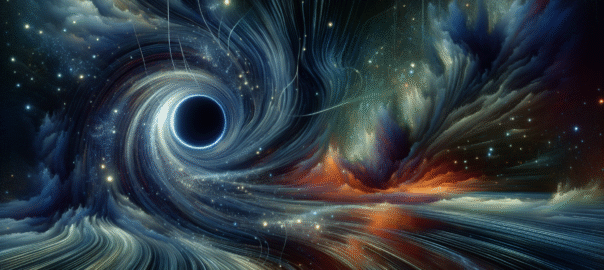Artificial intelligence unveils cosmic secrets, revolutionizing our understanding of black holes.
Astronomers are pushing the boundaries of scientific exploration by leveraging artificial intelligence to decode the mysterious realm of black holes. In a groundbreaking development, researchers are now using neural networks to unlock previously hidden information, as explored in our previous AI imaging breakthrough.
As a musician deeply fascinated by technological innovation, I’m reminded of how complex algorithms can transform seemingly incomprehensible data into profound insights – much like composing a symphony from scattered musical notes.
Artificial Intelligence Unravels Black Hole Mysteries
Researchers at the Morgridge Research Institute have trained a sophisticated neural network to analyze previously discarded radio telescope data, revealing unprecedented insights about Sagittarius A*, the supermassive black hole at our galaxy’s center. By processing millions of black hole simulations, the AI successfully generated an alternative image of the black hole’s structure, suggesting it rotates at near-maximum speed.
The breakthrough came through the Event Horizon Telescope’s complex data collection, where supercomputers traditionally filtered out challenging-to-interpret information. The neural network’s analysis indicates the black hole’s rotation axis points directly towards Earth, providing remarkable new perspectives on its behavior.
Lead researcher Michael Janssen from Radboud University Nijmegen emphasized that while their findings challenge existing theories, this represents merely the first step in AI-powered astronomical research. The team plans to continuously improve their models and simulations, potentially revolutionizing our understanding of cosmic phenomena.
This innovative approach demonstrates artificial intelligence’s potential to transform scientific research, offering insights that were previously unattainable through traditional analytical methods. By processing vast amounts of complex data, AI is becoming an indispensable tool in unraveling the universe’s most enigmatic mysteries.
Artificial Intelligence Black Hole Research Platform
Imagine a cloud-based platform that democratizes black hole research by allowing scientists, researchers, and enthusiasts worldwide to collaborate using AI-powered analysis tools. This subscription-based service would provide access to advanced neural network models, enabling users to process and interpret complex astronomical data without requiring massive computational resources.
Embracing the Cosmic AI Frontier
As we stand on the brink of this incredible technological revolution, one question remains: What other cosmic secrets will artificial intelligence help us uncover? I invite you to share your thoughts and predictions about AI’s role in scientific discovery.
Black Hole AI FAQ
Q1: How does AI help study black holes?
A: AI processes complex telescope data, revealing previously hidden details about black hole structures and behaviors.
Q2: What did this AI discovery reveal?
A: The AI suggested Sagittarius A* rotates at near-maximum speed, with its rotation axis pointing towards Earth.
Q3: Are these findings definitive?
A: Researchers consider this a first step, emphasizing ongoing model improvements and simulations.
